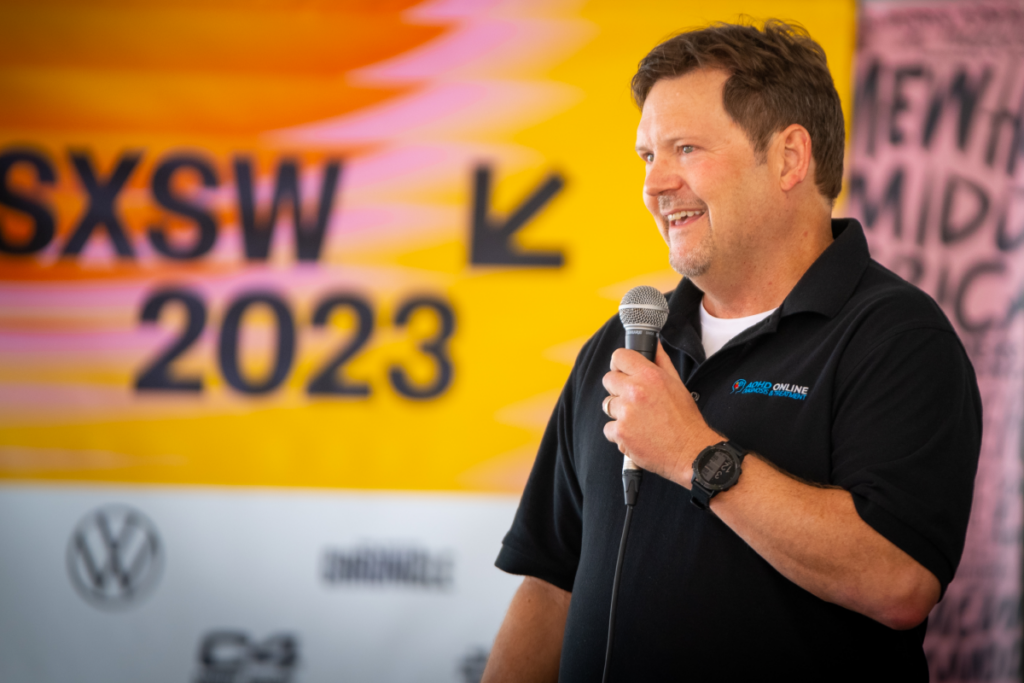
By Mark Ray
Creative. Driven. Caffeine-fueled. Those are just some of the adjectives that describe entrepreneurs.
But there are others that few people talk about, including depressed, anxious and addicted.
According to Keith Brophy, COO of Mentavi Health, entrepreneurs experience 6 times the normal rate of ADHD, 3 times the rate of bipolarism and twice the rate of addiction and depression. In fact, a recent study found that 72 percent of entrepreneurs face mental health challenges.
The numbers look even starker when you consider that 1 in 5 Americans experiences a mental health challenge each year.1 Clearly, entrepreneur mental health is a huge issue, one that affects not only startup founders but also their families and the employees who rely on them.
To help shine a light on this pressing issue, Brophy and Mentavi Health co-founder and CEO Zach Booker participated in a panel called “Mental Health and the Entrepreneur” at South by Southwest (SXSW) 2023. Moderated by Lindsay Guentzel, host of the Refocused podcast, the panel also included Dre Wallace, CEO of Opnr, which connects local performers and concert organizers, and Keith Chaney, CEO of Peadbo, which facilitates virtual personal advisory boards.
Let’s look at some key lessons from the SXSW panel.
Watch the whole presentation on YouTube.
The unseen challenges of entrepreneurship
Brophy kicked off the panel by describing what may have been the worst week of his life, which happened nearly 25 years ago. “I was certainly living the classic entrepreneur life: high stress, adrenaline driven, sleep deprivation; it seemed pretty normal,” he said. “It was very hard, but as I looked around at the other entrepreneurs I was friends with, the other founders, they were pretty much in the same boat.”
That particular week, Brophy was looking forward to meetings with three fellow entrepreneurs, but nothing went according to plan:
- The first man, who always seemed on top of the world, came to him in tears because he needed to find $100,000 to make payroll the next day. He couldn’t raise it, so he shuttered his company a few days later and quit the industry.
- The second man, who was typically calm and unflappable, never showed up for their meeting. “Eventually, we got the story that he left on the spur of the moment,” Brophy said. “He left his company, he left his home, he left the city, he left the state. He left his life essentially.”
- The third man, who was known to be a hard-driving entrepreneur with a high work ethic, died by suicide not long before their planned meeting.
“Those lessons shaped my career,” Brophy said. “I often still think of my friends and the price that can be paid by hard-driving people who are kind of wired that way, including myself.”
Recognizing how you’re wired
You can be wired to be a hard-driving entrepreneur, but you can also be wired with a predisposition for anxiety or ADHD. And addressing those challenges can’t happen until you know they exist.
Guentzel, whose podcast focuses on ADHD, was nearly 35 years old when she received her diagnosis, while Booker was in his late teens. In fact, the difficulty he had in getting diagnosed led to the creation of ADHD Online and eventually Mentavi Health.
To show how elusive self-awareness can be, Guentzel talked about only realizing she was an entrepreneur a year after she’d quit her job to focus full-time on her podcast. “Last week as I was back up in Minnesota getting my coordinating producer, Phil, ready to take over while I came down here, I had a moment where I went, ‘I’m an entrepreneur. When did that happen?'” she recalled.
People who need people
The panelists all agreed that surrounding yourself with people you trust is critically important. “The only way to really move forward is to have a team of people in place to help you,” Guentzel said.
In fact, that’s the whole purpose of Keith Chaney’s company, Peadbo. “Pretty much every company you know has a board of people with diverse skillsets to help them accomplish their business goals,” the panelist said, while speaking to the SXSW audience. “We believe that each of you individually should take that approach to identifying people you either respect, admire or look up to — to hold you accountable and to support you on your personal or professional journey.”
Keeping your distance
While entrepreneurs need to keep their friends close, they may need to keep their businesses at a distance. And, yes, that can be hard to do when you’re living and breathing your business 24/7.
Talking about startup funding, Dre Wallace of Opnr said, “The best thing you can do is just kind of treat it like it’s a game and really just pull the feelings and emotions out of it.”
For Chaney, it’s important to set boundaries. “I’m gonna make sure I make time to read to my daughters, to watch Encanto, to just make sure that there’s a very clear boundary between the business and my identity.”
Cope is an action verb
The panelists also agreed that coping mechanisms are essential, although what those look like varies greatly by the individual. For example, Wallace finds comfort in both music — she’s a longtime performer — and intense physical activity. “I don’t just do yoga; I like to do Vikram,” she says. “I don’t just like to cycle; I’m tearing up the Peloton.”
Brophy is also into extreme sports — ultramarathons, for example — but he also writes haikus. Chaney posts things he’s thankful for on Instagram every day. And Booker balances work with family time.
What united all the panelists was a commitment to prioritizing their mental health. Entrepreneurs face many challenges. Facing mental health challenges without support and coping skills shouldn’t be one of them.
Sources
1: https://www.mentalhealth.gov/basics/mental-health-myths-facts

